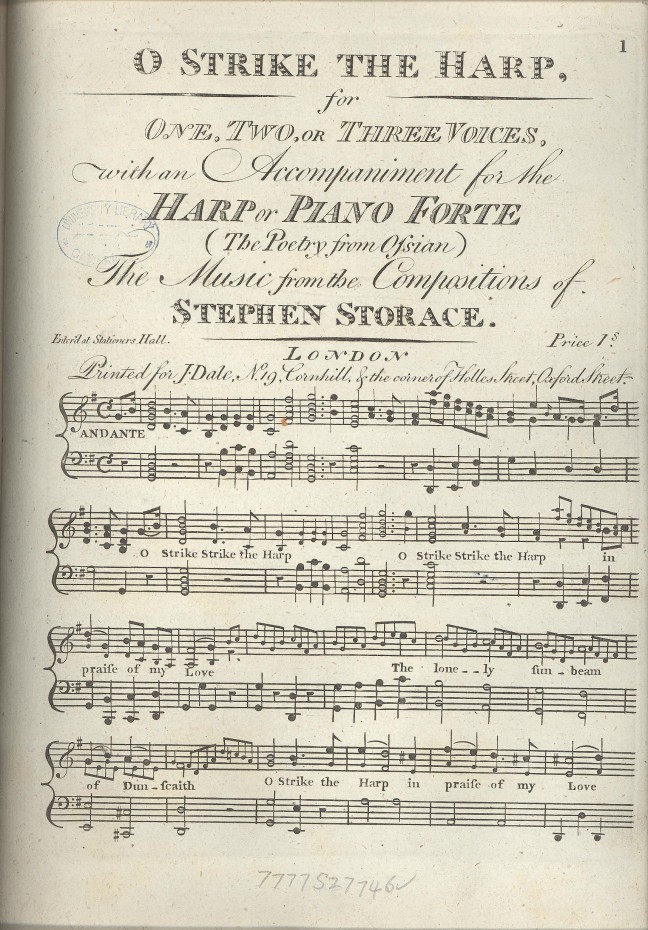The last day in February, and Scotland grinds to a halt. I had places to go and people to see, not to mention a blissful research day ahead of me. Still, if we get Snowmageddon over and out of the way, then we can look joyously ahead to the Claimed From Stationers’ Hall research network’s impending workshop here in Glasgow on Monday 26th March.
Workshop Monday 26th March
We’ll be talking about the heritage collections of Georgian/Victorian legal deposit music up and down the UK, looking at ways to promote it, contemplating the many ways it sheds light on contemporary cultural and social history, pondering how we can improve access to it, whether by finding aids or digitisation, and considering how big data might be used to reveal stories hitherto untold. Representatives of almost all the old (and the current) legal deposit libraries will all be there. (This must be a first! Assuredly, there would not have been a nationwide meeting of university librarians in the late Georgian era. Nonetheless, the Scottish universities were certainly in touch with one another, if only to liaise about their London agents, working more or less effectively to secure the publications they were owed! Getting their fair share of sheet music was probably the lowest priority on the libraries’ agenda back then!)
We have a limited number of workshop places left, so if you’re working or researching in this field and can manage a day-trip to Glasgow, do get in touch to tell us about your interest and secure one of those places! Our recent February Newsletter tells more about it.
THE WHEEL COMES FULL CIRCLE
As you know, every week or so, I check Michael Kassler’s invaluable bibliography, Music Entries in Stationers’ Hall 1710-1818, and see if I can find a piece of music whose anniversary of copyright registration falls on that day. Sometimes the piece is good, sometimes deservedly forgotten, but all of them tell us something about musical tastes and trends at the time they were written.
Today, as I cool my heels (and my toes) at home on an enforced snow-day, I turned to 1798 to see whose anniversary it might be today. I found Stephen Storace’s ‘O Strike the Harp. For one, two or three voices, with an accompaniment for the harp or piano forte. The poetry from Ossian‘, which the publisher Joseph Dale registered on 28 February 220 years ago. As Kassler states, the song can be found in the British Library: GB Lbl G.352.(42.).
Could I find an image of this song, clearly inspired by the late 18th century trend for minstrelsy, and still drawing on Macpherson’s Ossian poetry, despite the fairly well-proven doubts about its authenticity?
 Well, yes! Coincidentally, I used an image of this very song in my write-up of Sandra Tuppen’s Big Data talk at IAML(UK & Ireland) 2015. See ‘ASW 2015: The Bigger, the Better – A Big Data History of Music’ https://iamlukirl.wordpress.com/2015/04/17/asw-2015-the-bigger-the-better-a-big-data-history-of-music/ (17 April 2015)
Well, yes! Coincidentally, I used an image of this very song in my write-up of Sandra Tuppen’s Big Data talk at IAML(UK & Ireland) 2015. See ‘ASW 2015: The Bigger, the Better – A Big Data History of Music’ https://iamlukirl.wordpress.com/2015/04/17/asw-2015-the-bigger-the-better-a-big-data-history-of-music/ (17 April 2015)
The wheel certainly does come full circle: in earlier research, I spent considerable time thinking about minstrelsy as it appears in national song collections, and here’s a song that’s not a “national song”, but certainly has links with literary literacy. I was beginning to get interested in big data, which is why Sandra’s research attracted my attention. And big data is one of the themes at our forthcoming workshop, with two of her colleagues in attendance. Isn’t it satisfying when links join into a chain?
Postscript. Today, I discovered that the song has also been referenced in a new book, Figures of the Imagination: Fiction and Song in Britain, 1790–1850, by Roger Hansford. He comments that the song is about relationships, and that the lyrics might have been written from a minstrel’s standpoint. Another book to go on my “must read some day” reading list!

